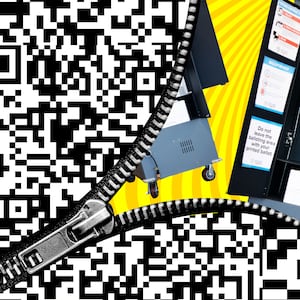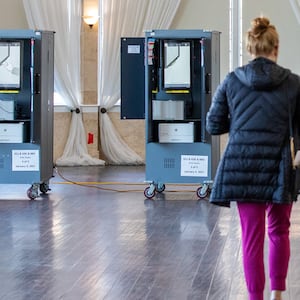U.S. District Judge Amy Totenberg was always worried that bad-faith actors would exploit a cybersecurity researcher’s report on voting machine vulnerabilities to cast doubt on the 2020 election. MyPillow magnate Mike Lindell is here to prove her right.
On Saturday, Lindell and his attorneys demanded a copy of the voting machine analysis that purports to show how a certain kind of Dominion ballot machine can be hacked. While that report was authored by a renowned computer security expert who merely posits that theoretical flaws should be fixed for future elections, Lindell appears to see this as an opportunity to bolster his bogus assertions that the 2020 presidential election was rigged.
When Judge Totenberg took the rare step of sealing this expert report back in July, she did so out of concern that its release would fuel conspiracy theories. Totenberg refused to entertain ideas about releasing it to the public, saying she was “at the end of my rope about that.”
But as the months ticked by, pressure kept mounting. Totenberg wouldn’t budge when a voting rights group asked for the report’s release in order to create public pressure for the Georgia secretary of state to update the system. And she held her ground even when a cybersecurity official at the Department of Homeland Security first expressed interest in reviewing the report.
Cybersecurity experts warned this continued secrecy would only draw more curiosity, an obvious case of the Streisand effect.
But Totenberg stuck to her guns last month, keeping even a redacted and “sanitized” version of the report secret while authorizing that government researchers at the DHS Cybersecurity and Infrastructure Security Agency assess the potential threat.
Now, Lindell has adopted this report as part of his conspiracy-riddled crusade.
Dominion Voting Systems sued Lindell in February 2021 as part of a nationwide effort by the company to clear its name after the nonstop barrage of accusations from Fox News, Newsmax, and One America News Network that the company’s machines were flawed—and part of a sinister plot to fake votes and kick out former President Donald Trump and put President Joe Biden in office.
Lindell is intervening in the Georgia case in an attempt to get a copy of University of Michigan cybersecurity researcher J. Alex Halderman’s report, so he can use it in his legal fight against Dominion.
“The Halderman report strongly supports the conclusion that Dominion’s electronic voting machines are vulnerable to intrusion, manipulation, and fraud,” says a court filing by Lindell attorney Kurt R. Hilbert.
The pillow entrepreneur is asking for “unrestricted access” to the redacted version of Halderman’s report, along with the ability to do whatever he wants with it—even release it. But Lindell is also asking to get a copy of the full, unredacted report, even if it needs to keep that version secret from the public.
Either way, it’s precisely why Totenberg decided to limit circulation of the report and keep it “attorneys’ eyes only” for those lawyers involved in the Georgia case.
During a court hearing in July 2021, the judge had concerns that the report would be “subject to disclosure in other litigation,” according to a transcript obtained by The Daily Beast.
Lindell, who has tied his MyPillow brand to conservative politics, has spent much of the last year whining about cancel culture and actively supporting right-wing media like Steve Bannon’s “War Room” podcast. But he has also become the torch-bearer for election conspiracy nonsense.
Despite attempts by election conspiracy theorists to latch onto Halderman's report, that cybersecurity researcher remains a relatively quiet and reserved academic. Halderman's efforts were conducted in his capacity as an expert in the court case, where he was hired as an expert on behalf of voting rights activists who sued the state of Georgia.
"I think people like Lindell are frustrating legitimate efforts to protect the right to vote with motions like this. They're a big part of the reason why we've not been able to share Dr. Halderman's report with responsible authorities and other members of the election security community who could help address the important concerns identified in the report," David Cross, an attorney for the voting rights activists, told The Daily Beast.
"And to be clear, the report does not identify any fraud in any election nor was that its purpose," he added.
Lindell’s request follows a similar move in January by the conservative Fox News, which is also seeking the report to bolster its own defense in a similar defamation lawsuit against Dominion. But his request could benefit from the fact that it comes on the heels of Georgia Secretary of State Brad Raffensperger’s recent decision to reverse himself and call for the report’s public disclosure.
At this point, the main parties on both sides of the Georgia case—the voting rights group and the state’s top elections official—both want it to go public. And the state’s governor seems to just want Raffensperger to deal with it already.
As a spokeswoman for Gov. Brian Kemp stated in January, ”Secretary of State Raffensperger led the procurement and implementation of the voting machines, and it is his duty to ensure those machines are safe, secure, and reliable. He should work to gather all relevant information regarding this report, thoroughly vet its findings, and assure Georgians he is doing everything possible to ensure the system, procedures, and equipment are completely secure.”
Raffensperger’s office did not immediately respond to a request for comment. Neither did attorneys for the voting rights group.
But if Lindell gets a copy of the report, expect another media stunt like his three-day “cyber symposium” that featured dubious cybersecurity experts claiming Trump lost a “stolen” election.
On Wednesday, two county elections officials in Colorado were indicted for engaging in election equipment tampering and official misconduct for allegedly leaking voter data to conspiracy theorists. Tina Peters, the Mesa County clerk, spoke at Lindell's symposium in South Dakota last year.
Shannon Vavra contributed to this story.









